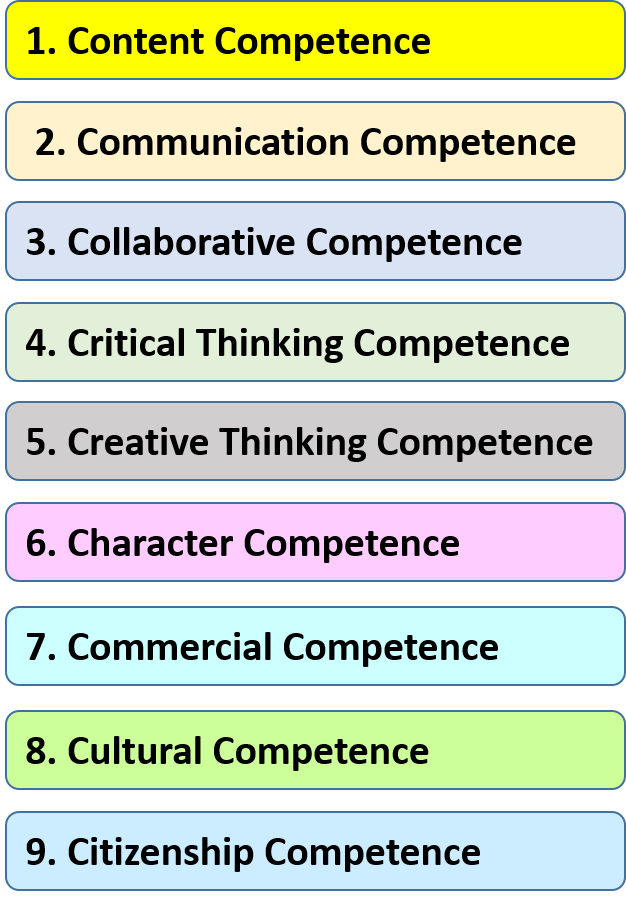Preparing Malaysian Learners for the 21st Century Digital World
The Malaysian education system is 60 years and is based on a factory model that was designed for preparing learners for the industrial age and we have done a pretty good job. One wonders whether this same system will adequately prepare learners who will graduate from our schools, colleges and universities for the Digital age which is evolving at such a rapid rate that few can make sense of it. It has been suggested that 60% of the jobs in 2030 have not been invented yet and how do we prepare the next generation of learners.

See the diagram above which list 9 core competencies that will be required of al Malaysian learners for the 21st century digital age.
1. Content Competence – At first glance, content competence seems fairly straightforward but it is not so. Much of the content imparted by schools and universities tends to focus on memorisation for ‘passing examinations’. Content competence is going beyond mere acquisition of the facts, concepts, principles , theories and laws of a discipline towards application of content in innovation.
2. Communication Competence – The Malaysian learner should not only be proficient in Bahasa Melayu but most importantly proficient in English and a third language such such as Mandarin, Tamil, Arabic, Japanese, French, German and so forth. Language proficiency should be confined to getting an ‘A’ in a language test but to be able to speak, write, read and able to understand. Proficiency in English is most important today with the vast store of resources on web in English which has been used by millions of people to advance themselves. For example, Google and YouTube has made available information for people to do things which they thought impossible and being proficient in English would greatly assist.
3. Collaborative Competence – The future workplace is a collaborative workplace where a group of people work together towards achieving a common goal by sharing their ideas and skills. It can happen in face-to-face settings as well as virtual teams. To prepare learners for such a workplace, it is important that the education system encourages learners to communicate with each other, learn to be tolerant, group-work, to compromise and be a team-player.
4. Critical Thinking Competence – Critical thinking is the ability to think clearly and rationally about what to do or what to believe. It includes the ability to engage in reflective and independent thinking. Good critical thinking skills are much needed in the workplace and employers have oftentimes been critical about the critical thinking skills and dispositions of graduates.
5. Creative Thinking Competence – Creative thinking is a highly priced competence in the future because learners will frequently be called upon to look at problems or situations from a fresh perspective and suggest unorthodox solutions. The rapidly changing workplace and increasing competition in both business and industry require human capital that is constantly innovating and engaging in creative thinking.
6. Commercial Competence – Increasingly education systems all over the world are gearing themselves towards producing students who are able to create their own jobs. Commercial competence refers to an individual’s ability to view situations from a commercial or business perspective which should begin in school. Children should learn how to look for business opportunities, how to innovate, how to set-up a business, learn about personal financing, banking and so forth. Subjects such as economics, commerce (perdagangan), live skills (kemahiran hidup) and personal financing should be taught to all learners.
7. Character Competence – Character generally describes the mental and moral qualities distinctive to an individual, reflected in his or her behavior which can refer to the person’s reputation. It implies a variety of attributes including virtues such as empathy, honesty, trustworthiness, compassion and other good behaviours or habits. Psychologist Lawrence Pervin defines moral character as “a disposition to express behavior in consistent patterns of functions across a range of situations” (Wikipedia, 2018). Similarly, the philosopher George refers to moral character as the “sum of one’s moral habits and dispositions. Moral character primarily refers to the assemblage of qualities that distinguish one individual from another. Oftentimes, we hear employers complain about the ‘attitude’ of Malaysian workers and those seeking employment. Attitude is an an integral component of character which implies the need to inculcate the ‘right’ attitude among learners that will enable them to function effectively in the workplace.
8. Cultural Competence – This competence is a necessity for all Malaysians because we live a multi-ethnic, multi-religious and multi-cultural society. Today, besides Malays, Chinese, Indians, Ibans, Kadazun-Dusun and others; there is an increasing number of Indonesians, Bangladeshis, Nepalis, Myanmaris, Thais, Filipinos and others who have Malaysia their home. Cultural competence is the ability to understand, communicate with and effectively interact with people across cultures. It is being aware of one’s own world view. developing positive attitudes towards cultural differences. gaining knowledge of different cultural practices and world views.
9. Citizenship Competence – As Malaysia moves towards a more democratic system of government, it becomes imperative that its citizens are able to make rational decisions both for oneself, the community and the state.